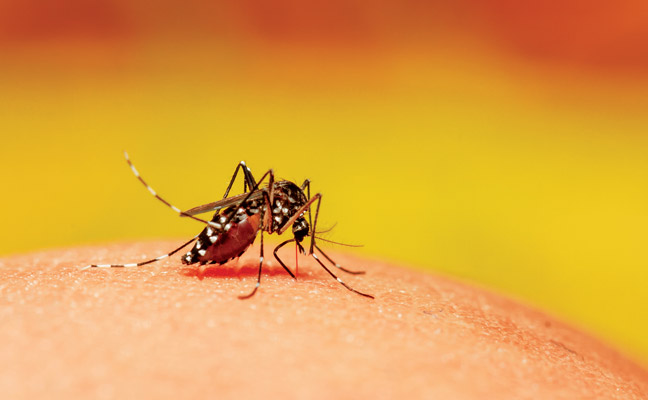
The yellow fever mosquito (Aedes aegypti) is a known carrier of dengue, among other illnesses. PHOTO: LOVESILHOUETTE/ ISTOCK / GETTY IMAGES PLUS/GETTY IMAGES
A clinical trial supported by the National Institutes of Health (NIH) is testing an experimental treatment designed to help people suffering the effects of dengue virus infections. The study is supported by NIH’s National Institute of Allergy and Infectious Diseases (NIAID) and will involve exposing adult volunteers to a weakened strain of dengue virus that causes a mild form of the disease. After exposure, volunteers will receive an investigational therapeutic at various doses to assess its safety and ability to lessen symptoms.
Dengue has been on the rise worldwide, as the Centers for Disease Control and Prevention (CDC) reported that 2024 was the highest on record. Dengue cases surged to record levels in the Americas with local U.S. transmission reported in Arizona, California, Florida, Hawaii and Texas. Dengue is endemic in Puerto Rico, which reported nearly 1,500 cases last year. One in 20 people who get sick with dengue progress to severe illness, which may lead to shock, internal bleeding and death. There is currently no Food and Drug Administration-approved treatment for dengue.
“When caring for a patient who is critically ill with dengue, healthcare providers have few options other than providing supportive care,” said NIAID Director Dr. Jeanne Marrazzo, MPH. “We must find safe and effective therapeutics to provide much-needed relief to people suffering from dengue.”
The new clinical trial will test the ability of AV-1, an investigational human monoclonal antibody therapeutic developed by AbViro in Bethesda, Md., to mitigate clinical symptoms when administered before and after dengue virus infection. The results of a previously completed NIAID-supported Phase 1 trial indicated that AV-1 is safe in humans, providing the basis for the new clinical trial to test its safety and efficacy.
If AV-1 shows promising results in this clinical trial, researchers may pursue further clinical evaluations of its safety and efficacy against the dengue virus.
As reported by PMP previously, there are three things to keep in mind when treating for the two mosquito species primarily responsible for transmitting dengue, yellow fever mosquitoes (Aedes aegypti) and Asian tiger mosquitoes (A. albopictus):
- Be aware of any symptoms among yourself or any employees who may have been in an area where mosquitoes can transmit dengue. The CDC reports that symptoms can begin after an incubation of anywhere from three to 10 days, and present as “fever accompanied by non-specific signs and symptoms such as nausea, vomiting, rash, muscle aches, joint pain, bone pain, pain behind the eyes, headache, or low white blood cell counts.” The AMA Update video podcast notes that “three out of every four cases are mild or asymptomatic,” making it hard to diagnose.
- Ensure timely reporting of dengue cases to public health authorities, so that they can help prevent a wider outbreak.
- Promote mosquito bite prevention measures among people living in or visiting areas with frequent or continuous dengue transmission.
Leave A Comment